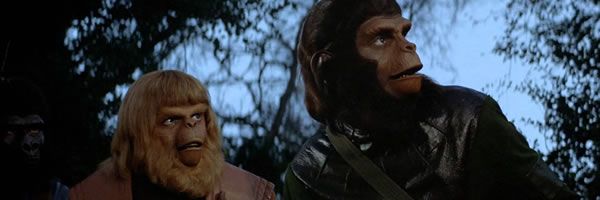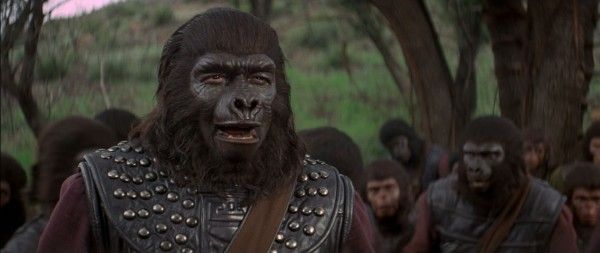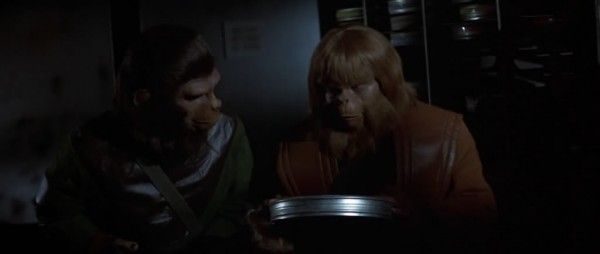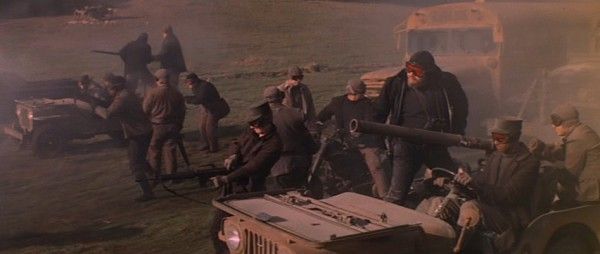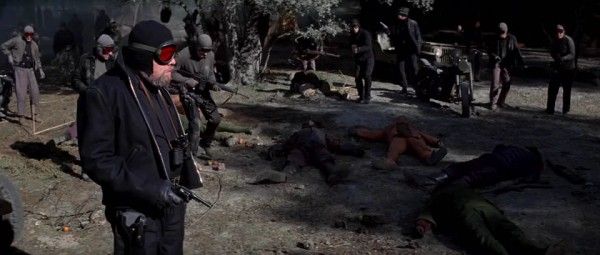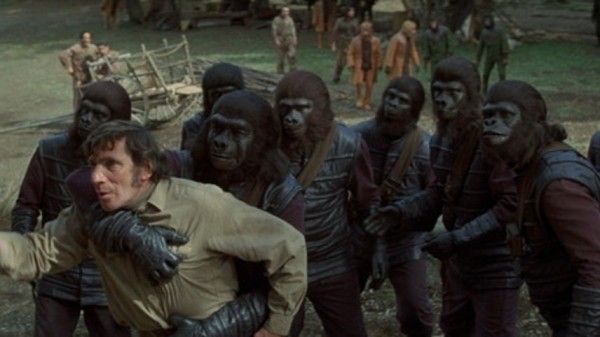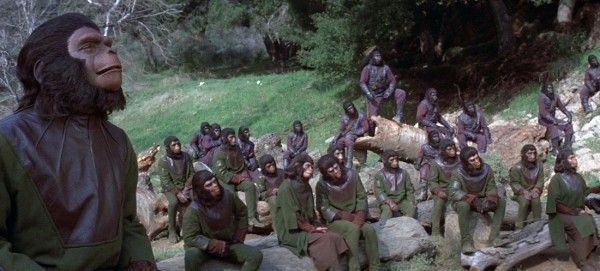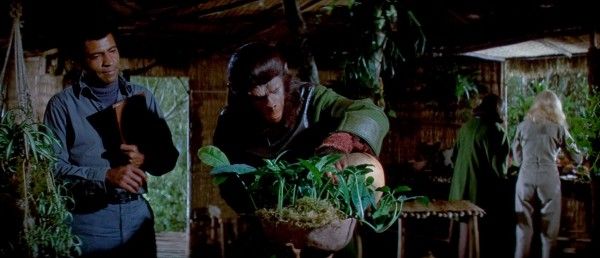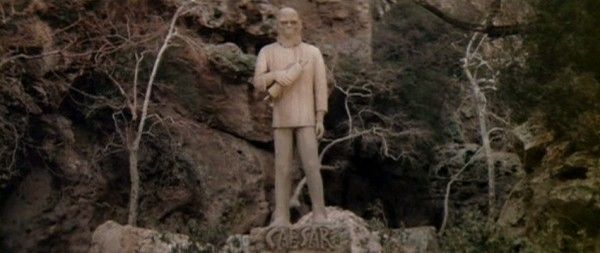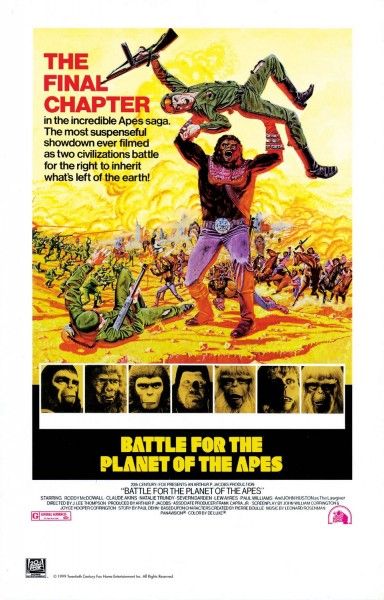[With Dawn of the Planet of the Apes opening on Friday, July 11th, I'm taking a look back at the Planet of the Apes movie franchise. These reviews contain spoilers.]
Up until Battle for the Planet of the Apes, the series had taken a decidedly dim view of humanity. Every lens—political, religious, social, historical, and philosophical—carried a fatalistic view of our species. Even when the commentary wasn't completely clear, like in Beneath the Planet of the Apes, the tone was unmistakable: Things are going to end horribly for our species, and there is nothing we can do. But after bumming audiences out over the course of four movies, Battle decided to take a different approach by being the first hopeful movie in the series. Unfortunately, the film never earns its radical new direction. In addition to superficially building on the previous films, it also comes to odds with an obligatory pessimism that undermines the movie's belief in a better tomorrow.
The film opens in North America in the year 2670 AD with a religious bent as The Lawgiver (John Huston) says "In the beginning…" before we're treated to a brief recap of the previous two movies. We're then informed that a war between humans and apes ensued following Conquest of the Planet of the Apes, most humans were forced underground due to radiation from an atomic bomb, and the ones who were unaffected went to live with the apes in nature and semi-harmony. Humans are now the species with fewer rights, and they're threatened with persecution by the militant apes, specifically General Aldo (Claude Akins).
However, Caesar (Roddy McDowall) is still the ruler of this small community, and settles all disputes. The movie opens with some striking yet subtle moments where Caesar's supremacy is re-established, but now he is the wizened leader rather than the angry revolutionary. During the opening credits, we see a beautiful silhouette of Caesar riding a horse in the distance (he's the only ape in the movie that rides one), and McDowall's excellent performance conveys the character's maturity.
When MacDonald (Austin Stoker), the humans' representative and Caesar's friend, informs the chief ape that the archives in the ruined city contain videos of Cornelius (McDowall) and Zira (Kim Hunter), Caesar is compelled to find those records, not only to finally see his parents, but also to learn about the future. However, mutated humans, now led by Governor Kolp (Severn Darden), occupy the fallen city, and will retaliate if they see any apes. Caesar, MacDonald, and Caesar's chief advisor Virgil (Paul Williams) trek out to infiltrate the archives, and although they manage to find the tapes, they're discovered by the humans, and must escape the ruins.
J. Lee Thompson returned to direct, and his skill once again shines through as he manages to create a distinct environment and upsetting tone with almost no money. Every Apes film had a smaller budget than the one before despite the franchises' box office success. Battle's budget was miniscule, but Thompson draws the audience deep into the atmosphere of the mutants' lair, and it's a striking counter to Caesar's sunny, edenic environs. The underground is drenched in shadows, the halls are claustrophobic, and almost everything is shot using Dutch angles. Virgil's name is never more appropriate as when the trio descends into this hell.
Although the apes and MacDonald are able to escape, Kolp sees this as a provocation of war even though Caesar's group never intended to confront the humans. Curiously, when Caesar returns, he doesn't really use the information he acquired. Instead, his actions have given Aldo the excuse he needs to prepare for war. He holds a secret council to discuss plans to usurp Caesar and go to war with the humans, but when he's overheard by Caesar's son Cornelius (Bobby Porter), he attempts to murder the young ape. Aldo and his fellow gorillas flee the scene, and the critically injured chimpanzee is found by his mother, Lisa (Natalie Trundy).
This move forces Caesar away from the action of the plot, and allows Aldo to take control as the bellicose gorilla declares martial law, rounds up the village's humans, and throws them into a gigantic cage. Meanwhile, Kolp and his soldiers charge towards the ape village, and kill one gorilla on the way while the other manages to escape and inform the village that the humans are coming. The stage is set for a grand battle, or at least as much battle as the tiny production could afford.
However, it makes the same mistake as many other action movies—characters we don't like or care about fighting each other. We certainly don't feel any compassion for the humans (a fact that's screwy in its own way), Caesar is at Cornelius' bedside, and so Virgil is the only good main character on the ground. The battle wages on, and it's not until Cornelius dies—revealing that he wasn't killed by humans, which means it must have been by apes—that Caesar goes on to the battlefield, and uses his strategy to lead his community to victory.
Battle for the Planet of the Apes is a relatively short film (the theatrical cut is 86 minutes), and about a third of it is spent on low-budget set pieces. Thompson does the best he can given his small budget, but the length of these scenes is clearly an appeal to lighten up a series that had become mired in darkness. Conquest had scared away young audience members, and Battle was an attempt to win them back with exciting action scenes rather than the disturbing violence of the previous movie.
However, the film is still filled with moments that have the thoughtfulness of the previous installments. Early in the film, Abe the teacher (Noah Keen) is trying to teach the community how to write, but when Aldo and his fellow gorillas destroy the classroom, Abe shouts, "No!" We learn this is the one word that humans are not allowed to say to apes because it's a reminder of their enslavement. It's the new "N-word", and the film also openly wonders if this makes the village's humans into second-class citizens because they're subject to the laws of apes. Unfortunately, the movie never builds on this concept.
The movie goes a bit deeper into whether or not violence is inevitable when men such as Kolp and apes such as Aldo walk to the Earth. "Is it right to kill so that good should prevail?" muses Caesar. He's trying to figure out a way to turn ape history away from the cruel, self-destructive arc of human history, which is one of the reason's he's compelled to visit the archive and learn the future of his people. Whereas Escape and Conquest posited that history is unalterable, Battle wants to believe that if history can be properly assessed, then its course of can be changed. Virgil shares the same opinion by telling MacDonald that the future is like a highway with infinite paths. Unfortunately, no one replies that it's impossible to know if future has been altered until we arrive at that future.
There's an exciting moment where the movie hints that it will continue the fatalism of the previous films by showing that history is written by the winners. We learned in Escape that Aldo was the one who started the rebellion, not Caesar. Battle offers the possibility that Aldo and his gorillas eventually took over, and the victors rewrote history with Aldo as the savior of the apes.
The movie manages to hold this tension until the end when, after the battle, Caesar learns that Aldo was responsible for Cornelius' death and therefore broke the first and most scared ape law: "Ape shall never kill Ape". Even though the film has been bogged down at points by action scenes that go on for too long, Caesar and Aldo have an intense showdown in the branches of a tree. While the intention of the scene seems to be that the future of the apes will be decided upon by the victor, there's really no way Aldo can win. Even if he kills Caesar, the ape community will never follow Aldo because he broke their most sacred law. At most, Caesar killing Aldo will show that apes can never be better than men. As Aldo and Caesar begin to fight to the death, Macdonald tells one of his fellow captives, "I guess you can say they just joined the human race."
Except Battle doesn't really get into the fight. Instead, it abstains by having Aldo fall to his death rather than being killed by Caesar. Caesar's question of "Is it right to kill evil so that good should prevail?" has been avoided through happenstance. Some viewers could make the argument that Caesar killed Aldo by refusing to save him, but then we're dealing in technicalities rather than a decisive position. Previous Apes movies had the confidence to make decisions that Battle avoids. There's a difference between ambiguity and ambivalence, and Battle chooses the latter.
Paul Dehn's original script for Battle of the Planet of the Apes didn't have this problem. As the Blu-ray featurette points out, Dehn's vision was unquestionably dark. In his script, Caesar has followed the path of other rules by taking up a throne and becoming a cruel king. At one point in Dehn's script, the script describes Caesar as "yelling like Hitler" (pg. 50). Dehn, living through World War II, had a much bleaker view of humanity. This provided a cohesive vision through the second-half of Beneath and throughout Escape and Conquest (or at least through Conquest's original ending). His Battle for the Planet of the Apes was a natural continuation of what came before.
Dehn's script was rejected and with the screenwriter too ill to continue, writers John William Corrington & Joyce Hooper Corrington came on board to build not only on Dehn's story, but also take the theatrical conclusion of Conquest and try to steer it towards a hopeful vision for the future. To their credit, they also tried interweaving some of the heavier plot points, but their script lacked Dehn's commitment, and the studio was no longer willing to support such a pessimistic approach. Battle therefore feels like compromised picture that reduces complex themes into random musings. When coupled with the small scale of the picture, Battle feels more like a minor skirmish in ape history rather than a pivotal moment.
While Battle can talk about changing the future, this hope isn't supported by the plot. Video of Cornelius and Zira can't show up in the archives unless they left the destroyed planet in 3955. The planet is still doomed, but Battle is ambivalent as the final scene shows a human and ape child play-pushing each other, and then the camera moves to a statue of Caesar "crying" as a drop of water rolls down the statue's cheek. Whereas the previous films had the will to make a strong, declarative conclusion, Battle leaves the issue to the audience.
Regardless of how you personally feel about human nature and our future, the best Apes films confidently pursue strong ideas that force the audience to consider difficult questions and unsettling answers. They're great sci-fi not only because they transport us to new worlds and exciting situations, but also because they embrace fascinating concepts. The fifth Apes film is always on the edge of following the franchise's strong heritage (even Beneath, although deeply flawed, is still ballsy), and I'm not opposed to the movie's belief that there's hope for the future. I admire that sentiment. But it never makes a compelling argument for that opinion. It always falls just shy of its aspirations, whether it's biblical (in addition to the opening lines, the movie has a muddled Cain & Abel parable), historical, or sociological. Battle for the Planet of the Apes tried to live up to the franchise's history but taking multiple paths, but it never reached the powerful destination of the previous four movies. But at least it genuinely aspired to embrace the soul of the original Apes saga. The same could not be said for the remake.
Rating: C+
[Tomorrow: The Remake of Planet of the Apes]
Other Entries:
- Planet of the Apes
- Beneath the Planet of the Apes
- Escape from the Planet of the Apes
- Conquest of the Planet of the Apes
- Planet of the Apes (2001)
- Rise of the Planet of the Apes

